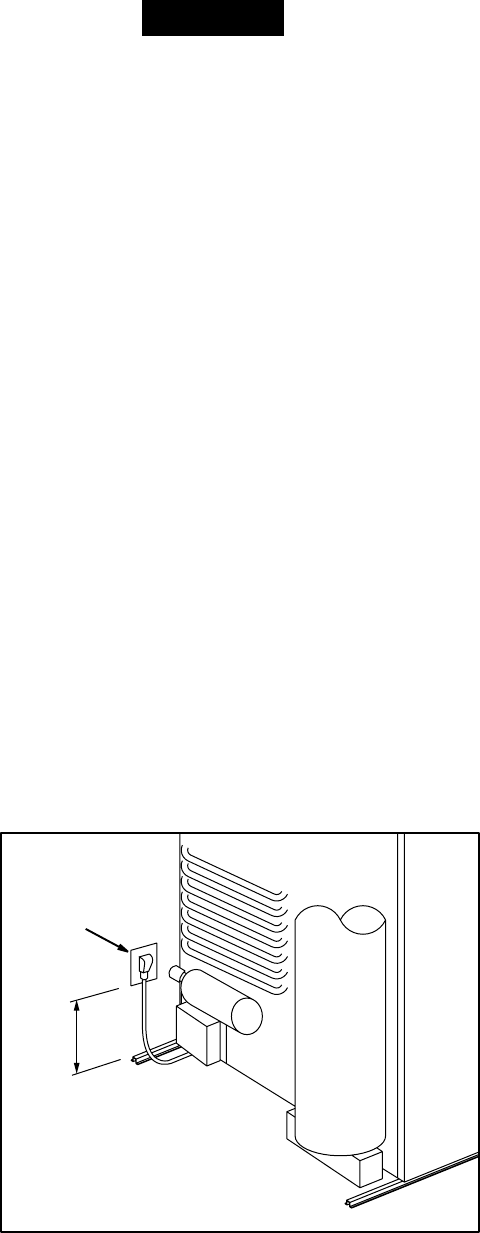
4
INSTALLATION
GENERAL INSTRUCTION
This appliance is designed for storage of foods and
storage of frozen foods and making ice.
This appliance is certified under the latest edition of
ANSI Z21.19•CSA 1.4 Refrigerators using gas fuel.
The installation must conform with local codes, or in ab-
sence of local codes, the following standards as appli-
cable.
In the U.S. the installation must conform with:
1. National Fuel Gas Code, ANSI Z223.1/NFPA 54
(latest edition).
2. Recreational Vehicles Code, ANSI A119.2 (latest
edition)
3. Manufactured Home Construction and Safety
Standard, Title 24 CFR, Part 3280.
If an external electrical source is utilized, the refrigera-
tor, when installed, must be electrically grounded in ac-
cordance with local codes or, in the absence of local
codes, the National Electrical Code, ANSI/NFPA 70 - (lat-
est edition).
In CANADA, the installation must conform with:
1. Natural Gas and Propane Installation Code,
CSA B149.1
2. CSA Z240 RV Series, Recreational Vehicles.
3. Current CSA Z240.4, Gas-equipped Recreational
Vehicles and Mobile Housing.
If an external electrical source is utilized, the refrigera-
tor, when installed, must be electrically grounded in ac-
cordance with local codes or, in the absence of local
codes, the Canadian Electrical Code, CSA C22.1, Parts
I and II - (latest edition).
VENTILATION
The installation shall be made in such a manner as to
separate the combustion system from the living space
of the mobile home or recreational vehicle. Openings for
air supply or for venting of combustion products shall
have a minimum dimension of not less than 1/4 inch.
Proper installation requires one lower fresh air intake
and one upper exhaust vent. The ventilation kits shown
in this instruction manual have been certified for use
with the refrigerator models listed in the Table.
For “Certified Vent System Kits” see page 14.
The ventilation kits must be installed and used without
modification. An opening toward the outside at floor level
in the refrigerator compartment must be provided for
ventilation of heavier-than-air fuel gases. The lower vent
of the recommended kits is provided with proper size
openings. The flow of combustion and ventilating air must
not be obstructed.
The lower side vent is fitted with a panel, which provides
an adequate access opening for ready serviceability of
the burner and control manifold of the refrigerator. This
should be centered on the back of the refrigerator.
GAS CONNECTION
Hook up to the gas supply line is accomplished at the
manual gas valve, which is furnished with a 3/8" SAE
(UNF 5/8" -18) male flare connection. All completed con-
nections should be checked for leaks with soapy water.
DO NOT use a flame to check for gas leaks.
The gas supply system must incorporate a pressure regu-
lator to maintain a supply pressure of not more than 11
inches water column.
When testing the gas supply system at test pressures in
excess of 1/2 psi, the refrigerator and its individual shutoff
valve must be disconnected from the gas supply piping
system.
When testing the gas supply system at pressures less
than or equal to 1/2 psi, the appliance must be isolated
from the gas supply piping system by closing its indi-
vidual manual shutoff valve.
In case detailed instructions on the installation and con-
nection to the gas supply are required, contact your
dealer or distributor.
ELECTRICAL CONNECTION
120 Volts AC Connection
The refrigerator is equipped with a three-prong (ground-
ing) plug for your protection against shock hazards and
should be plugged directly into a properly grounded
three-prong receptacle. DO NOT cut or remove the
grounding prong from this plug. The free length of the
cord is 2 feet and therefore recommended that the re-
ceptacle be located to the left side of the refrigerator
(viewed from the rear) and approximately 6 inches from
the floor (see FIG. 3). This allows easy access through
the vent door. The cord should be routed to avoid direct
contact with the burner cover, flue cover or any other
components that could damage the cord insulation.
! WARNING
6”
120 Volt AC
receptacle
FIG. 3


















